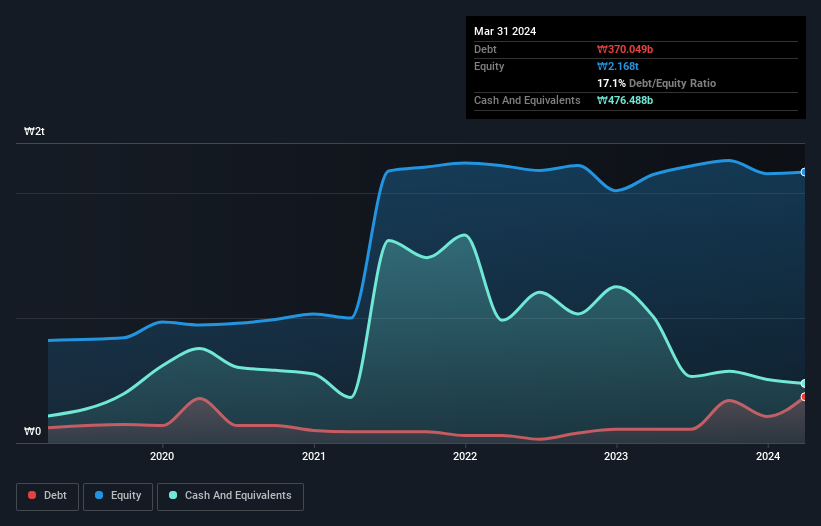- South Korea
- /
- Aerospace & Defense
- /
- KOSE:A272210
Hanwha Systems (KRX:272210) Has A Rock Solid Balance Sheet

Howard Marks put it nicely when he said that, rather than worrying about share price volatility, 'The possibility of permanent loss is the risk I worry about... and every practical investor I know worries about.' It's only natural to consider a company's balance sheet when you examine how risky it is, since debt is often involved when a business collapses. We note that Hanwha Systems Co., Ltd. (KRX:272210) does have debt on its balance sheet. But should shareholders be worried about its use of debt?
When Is Debt Dangerous?
Generally speaking, debt only becomes a real problem when a company can't easily pay it off, either by raising capital or with its own cash flow. Part and parcel of capitalism is the process of 'creative destruction' where failed businesses are mercilessly liquidated by their bankers. However, a more usual (but still expensive) situation is where a company must dilute shareholders at a cheap share price simply to get debt under control. Of course, debt can be an important tool in businesses, particularly capital heavy businesses. The first step when considering a company's debt levels is to consider its cash and debt together.
Check out our latest analysis for Hanwha Systems
What Is Hanwha Systems's Net Debt?
You can click the graphic below for the historical numbers, but it shows that as of March 2024 Hanwha Systems had ₩370.0b of debt, an increase on ₩110.0b, over one year. However, it does have ₩476.5b in cash offsetting this, leading to net cash of ₩106.4b.

A Look At Hanwha Systems' Liabilities
We can see from the most recent balance sheet that Hanwha Systems had liabilities of ₩2.17t falling due within a year, and liabilities of ₩393.0b due beyond that. Offsetting these obligations, it had cash of ₩476.5b as well as receivables valued at ₩253.4b due within 12 months. So its liabilities total ₩1.83t more than the combination of its cash and short-term receivables.
While this might seem like a lot, it is not so bad since Hanwha Systems has a market capitalization of ₩3.28t, and so it could probably strengthen its balance sheet by raising capital if it needed to. But it's clear that we should definitely closely examine whether it can manage its debt without dilution. Despite its noteworthy liabilities, Hanwha Systems boasts net cash, so it's fair to say it does not have a heavy debt load!
Even more impressive was the fact that Hanwha Systems grew its EBIT by 230% over twelve months. That boost will make it even easier to pay down debt going forward. When analysing debt levels, the balance sheet is the obvious place to start. But it is future earnings, more than anything, that will determine Hanwha Systems's ability to maintain a healthy balance sheet going forward. So if you want to see what the professionals think, you might find this free report on analyst profit forecasts to be interesting.
Finally, while the tax-man may adore accounting profits, lenders only accept cold hard cash. While Hanwha Systems has net cash on its balance sheet, it's still worth taking a look at its ability to convert earnings before interest and tax (EBIT) to free cash flow, to help us understand how quickly it is building (or eroding) that cash balance. Happily for any shareholders, Hanwha Systems actually produced more free cash flow than EBIT over the last three years. There's nothing better than incoming cash when it comes to staying in your lenders' good graces.
Summing Up
While Hanwha Systems does have more liabilities than liquid assets, it also has net cash of ₩106.4b. The cherry on top was that in converted 112% of that EBIT to free cash flow, bringing in -₩2.2b. So is Hanwha Systems's debt a risk? It doesn't seem so to us. The balance sheet is clearly the area to focus on when you are analysing debt. However, not all investment risk resides within the balance sheet - far from it. To that end, you should learn about the 3 warning signs we've spotted with Hanwha Systems (including 1 which is a bit concerning) .
Of course, if you're the type of investor who prefers buying stocks without the burden of debt, then don't hesitate to discover our exclusive list of net cash growth stocks, today.
If you're looking to trade Hanwha Systems, open an account with the lowest-cost platform trusted by professionals, Interactive Brokers.
With clients in over 200 countries and territories, and access to 160 markets, IBKR lets you trade stocks, options, futures, forex, bonds and funds from a single integrated account.
Enjoy no hidden fees, no account minimums, and FX conversion rates as low as 0.03%, far better than what most brokers offer.
Sponsored ContentValuation is complex, but we're here to simplify it.
Discover if Hanwha Systems might be undervalued or overvalued with our detailed analysis, featuring fair value estimates, potential risks, dividends, insider trades, and its financial condition.
Access Free AnalysisHave feedback on this article? Concerned about the content? Get in touch with us directly. Alternatively, email editorial-team (at) simplywallst.com.
This article by Simply Wall St is general in nature. We provide commentary based on historical data and analyst forecasts only using an unbiased methodology and our articles are not intended to be financial advice. It does not constitute a recommendation to buy or sell any stock, and does not take account of your objectives, or your financial situation. We aim to bring you long-term focused analysis driven by fundamental data. Note that our analysis may not factor in the latest price-sensitive company announcements or qualitative material. Simply Wall St has no position in any stocks mentioned.
About KOSE:A272210
Hanwha Systems
Hanwha Systems Co., Ltd. manufacture and sell various military equipments in South Korea and internationally.
Excellent balance sheet and fair value.
Market Insights
Community Narratives


